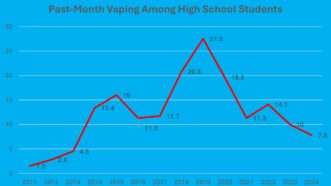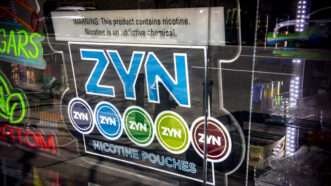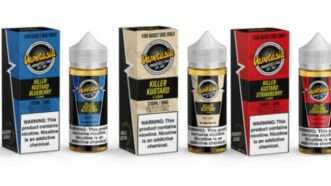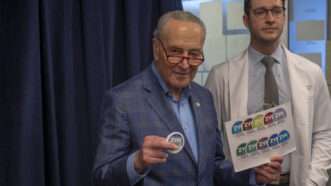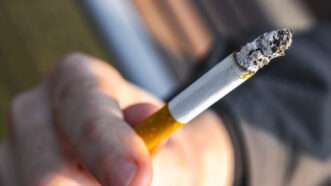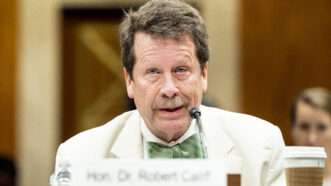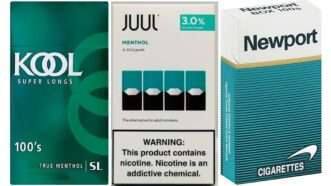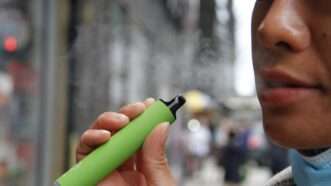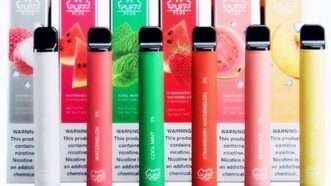E-cigarettes
Oregon's E-Cigarette Censorship Is Unconstitutional—and Makes No Sense
Sometimes the state's rules require stores to cover almost the entire label of products—in places that don't even admit minors.
Trump Promised To 'Save Vaping.' His FDA Head Does Not Seem Inclined To Do That.
Marty Makary grossly exaggerates the prevalence of adolescent nicotine addiction, the concern underlying his agency's restrictions on e-cigarette flavors.
Gen Zyn: Nicotine Pouches Help Curb Youth Smoking Rates
As young adults swap cigarettes and vapes for oral nicotine products, policymakers should recognize this shift as harm reduction instead of cracking down on personal choice.
The Supreme Court Blesses the FDA's Rejection of Flavored Nicotine Vapes
The justices unanimously overturned a 5th Circuit decision that deemed the agency's treatment of e-liquids "arbitrary and capricious."
Sell Flavored Tobacco in Massachusetts, Go To Jail
Massachusetts outlawed flavored tobacco. Now, just as criminal justice groups warned, a vape shop owner is serving time.
The FDA Proposes a De Facto Cigarette Ban, Which Would Expand the Disastrous War on Drugs
Mandating negligible nicotine levels in tobacco products would create a big black market and criminalize currently legal transactions.
Shooting the Messenger and Blaming the Victim
How cops, politicians, and bureaucrats tried to dodge responsibility in 2024
A Change in Administrations Underlines the Stakes of an E-Cigarette Case SCOTUS Heard This Week
An e-liquid manufacturer is challenging the FDA's "arbitrary and capricious" rejection of flavored vaping products.
Food and Drug Administration Defends Refusal To Approve Flavored E-Cigarettes Before the Supreme Court
The FDA’s regulations are burdensome and unnecessary to address the inflated high school vaping epidemic.
SCOTUS Will Decide Whether the FDA's 'Regulatory Switcheroos' on Vaping Were 'Arbitrary and Capricious'
The 5th Circuit ruled that the agency violated the Administrative Procedure Act when it rejected applications from manufacturers of flavored nicotine e-liquids.
FDA Belatedly and Arbitrarily Approves Menthol Vapes
The agency's inscrutable approach to harm-reducing nicotine products sacrifices consumer choice and public health on the altar of youth protection.
More Evidence that Bans on Flavored Vaping Products May Increase Teen Smoking
Policies that increase the use of traditional cigarettes are unlikely to improve public health.
Expanding the Drug War To Include Tobacco Would Be a Big Mistake
The judicially approved Brookline ban reflects a broader trend among progressives who should know better.
Chuck Schumer Attacks Lifesaving Zyn Nicotine Pouches
Zyn pouches are a dramatically safer alternative to smoking.
It's Not a Cigarette. It's Not a Vape. And It's Big in Japan.
Heated tobacco products are coming to America, at long last. How will they change the landscape for smokers and prohibitionists?
En Banc Fifth Circuit Rejects FDA's Vaping Regulation "Surprise Switcheroo"
Another significant court loss for the Food & Drug Administration's arbitrary approach to regulating vaping products.
Repeal Day Lessons for Tobacco Prohibitionists
Today’s nicotine prohibitionists may do well to take a few moments to contemplate their anti-alcohol predecessors.
Remember the Teen Vaping 'Epidemic'?
Policies inspired by that exaggerated threat continue to undermine the harm-reducing potential of e-cigarettes.
Sales Data Indicate That Restrictions on Flavored Vaping Products Encourage Smoking
A study found a "high rate of substitution" between vapes and cigarettes, suggesting that policies aimed at preventing underage use are undermining public health.
American Lung Association Demands the FDA Mislead the Public About Vaping
Providing accurate information about the risks of different nicotine products is long overdue.
Another Appeals Court Accuses the FDA of Committing "Surprise Switcheroo"
The U.S. Court of Appeals for the D.C. Circuit takes issue with how the FDA evaluated Fontem's unflavored vaping products.
Uneducating Americans on Vaping
Since the FDA began regulating vaping products as "tobacco" products, American ignorance about vaping's realtive risks has gotten worse.
New York Governor Gauging Support for Full Ban on All Cigarette Sales
Kathy Hochul isn't just waging a war on menthols. She's also floating a ban on all cigarette sales in the state.
Do Studies Show Vaping Causes Cancer? No.
Even the best studies haven't surmounted a key statistical issue, and they tend to distort the evidence to make e-cigarettes look dangerous.
The 5th Circuit Rebukes the FDA for Flouting the Law While Imposing a De Facto Ban on Flavored E-Cigarettes
The appeals court says regulators violated the Administrative Procedure Act when they tried to pull menthol vapes off the market.
Shoddy Research Reinforces Anti-Vaping Narrative
Thanks to tendentiously sloppy research, most Americans think vaping is just as dangerous as smoking. That’s not true.
Massachusetts' Tobacco Ban Went as Badly as You'd Expect
And now the state thinks it needs to crack down even more.
My Daughter's School District Warns That Nicotine Vapers Could Be Unknowingly Inhaling Fentanyl
It is hard to find evidence of this "disturbing trend."
Biden's Anti-Vaping Policies Undermine Cancer Moonshot
To reduce cancer deaths, Biden should stop restricting safer nicotine alternatives.
A Medical Journal Retracts a 2022 Study That Linked Vaping to Cancer
The obvious problems with the article reflect a broader pattern that suggests a peer review bias against e-cigarettes.
These Memos Show That FDA Regulation of E-Cigarettes Is Driven by Dubious Value Judgments Rather Than Science
The agency is determined to ban the flavors that former smokers overwhelmingly prefer. For the children.
Diseases That Studies Linked to E-Cigarettes Generally Were Diagnosed Before Subjects Began Vaping
The failure to consider the timing of diagnoses makes it impossible to draw causal inferences.
Oregon's Anti-Vape Laws Will Put This Deaf Immigrant's Hookah Shop Out of Business
You can smoke all the pot you want, but flavored tobacco or nicotine is soon to be illegal.
California's Vaping Flavor Ban Could Be Lethal
By making e-cigarettes less appealing, it will discourage smokers from switching to a much less hazardous nicotine habit.
The Election Betting Markets Fell Short. They're Still the Most Flexible Predictor.
People with money on the line try harder than pundits to be right, and they adjust quickly when they've made a mistake.
California Voters Keep State Ban on Flavored Tobacco and Vapes
Bring on the black market.
Will Californians Overrule the State's Intrusive Flavored Tobacco Ban?
Voters have shown a propensity to veto the meddlesome efforts of lawmakers in the past.
New Survey Data Show Adolescent Vaping Remains Far Less Common Than It Was a Few Years Ago
The CDC is still citing underage consumption as a reason to restrict adult access.
The FDA's Perverse Plan To Ban Menthol Cigarettes and Cap Nicotine Levels
The FDA's nicotine restrictions will push consumers toward black-market suppliers, who are completely unconstrained by the FDA’s regulations.
FDA Admits Vaping Is Safer Than Smoking But Refuses To Correct the Record
Don’t expect a change in course, despite the long-awaited admission.
New Survey Data Cast Further Doubt on the FDA's Opposition to Flavored E-Cigarettes
The "epidemic" of adolescent vaping seems to be fading fast, and vaping is replacing smoking among adults, a harm-reducing trend that regulators seem determined to discourage.
Eleventh Circuit Finds FDA Treatment of Vaping Product Marketing Applications to be Arbitrary & Capricious
The likelihood that the Supreme Court considers the FDA's treatment of vaping products is increasing.
The Food & Drug Administration Has a Vaping Problem
Something is wrong at the Food & Drug Administration's Center for Tobacco Products, and federal courts are beginning to notice.
The FDA Perversely Seeks To Make Both Cigarettes and Harm-Reducing Alternatives Less Appealing
The agency’s policies would boost the black market and smoking-related deaths.
The FDA's War on Juul Will Kill People
Bureaucrats say they want to save lives. But they're moving to block a tool that is proven to help smokers quit entirely.
A Broader Perspective on "My Body, My Choice"
The principle has implications that go far beyond abortion. Some of them deserve far more attention than they have gotten to this point.
The FDA Uses Its New Authority To Close Off the Last Remaining Legal Option for Vapers Who Like Flavor Variety
In a move that is likely to undermine public health, the agency warns that products containing synthetic nicotine "will be subject to FDA enforcement."



